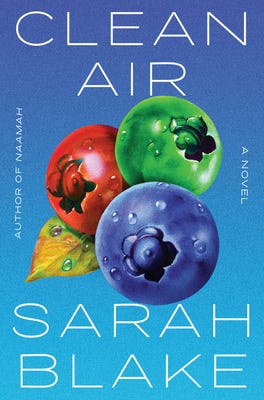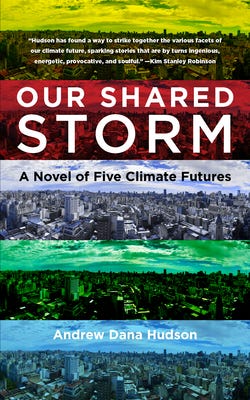Today the author of the experimental short story collection Our Shared Storm, Andrew Dana Hudson, talks to Sarah Blake, author of the adult dystopian novel Clean Air.
Andrew Dana Hudson: Sarah, your novel Clean Air is ecofiction, but it also feels like pandemic fiction—the masks, the confined life, the focus on health dangers rather than big storms or rising seas. And I think you captured some of the fluctuations of emotion COVID brought: anxiety, boredom, dread, despair, occasionally hope. When did you start writing the book, and how did that process change as the pandemic unfolded?
Sarah Blake: I started (and finished) writing the first draft in 2017, but I was going through the edits from my editor and doing my final revision during lockdown over here in the UK. I had been saving emails and news articles, writing down the things that were flying off the shelves, thinking about all the ways I hadn’t been able to predict the kind of panic that Covid brought on. But I didn’t end up using many of those details, and it was a relief that the catastrophe that I had created was a new thing, an improbable thing.
What was your process like for writing (varying levels of) (im)probable things?
ADH: Wow! I gotta say, even if not originally intended, Clean Air definitely resonated with big chunks of my pandemic experience. I suppose there's some "death of the cli-fi author" there: we don't always get to choose which disasters will make it feel like our stories are coming true.
For Our Shared Storm, I had an ambitious enough structure with my five parallel-future-stories that I kept the actual storm part a bit generic. There are some authors that do a great job of situating a disaster in a particular locale's unique geography—busting out the flood maps and all that—but I wanted that part of my book to feel intense more by how, yes, probable, even inevitable, such bigger, scarier, harder-to-predict storms will be and already are. I focused more on the cultural and political shifts, and tried to sell each of those as probable within their own context. It's been interesting to see how reviewers and readers have picked out different scenarios as the "most likely" one. (I'd be curious if one stuck out to you in this way.)
I suppose one result of that strategy is that climate change takes a mild backseat in my book to climate politics, to how people treat each other. Clean Air had a bit of that too, but one thing I appreciated was that, even when their boxed-in culture felt dystopian, it never quite slipped into that "the climate cure is worse than the disease" zone that I see sometimes. The atmosphere, and the way it was weaponized, remained the locus of danger. I wondered while reading how conscious that discipline was on your part?
SB: For me, Clean Air's catastrophe resulted in something utopic. People are working together. Crime has been non-existent. Money is seen for the sham that it is. Having people in varied careers is truly valued. Religion is no longer a guiding principle. Etc., etc., etc. I tried to put as many things as I could into a "better" future--things that I would like at least. It was about starting at that place and exploring how people's individual lives, Izabel's life, could still be anything but utopic. And by untangling Izabel's unease, I ended up uncovering weaknesses of the society as well. I probably avoided "the climate cure is worse than the disease" because I've never thought that could possibly be the case!
In terms of your scenarios, I don't think one stood out as the "most likely," but I did think that SSP5 seemed like the "least likely." While I think that scenario is sort of our current trajectory, your version of it made everyone way more creative and fun than they are right now! I enjoyed that. Were there stories you enjoyed writing more than others?
ADH: (For readers: the Shared Socioeconomic Pathways, aka the SSPs, are a set of scenarios used in the latest IPCC reports, and are the inspiration for the five novelettes that make up my book. In brief: SSP1 = Sustainability, SSP2 = middle of the road, SSP3 = breakdown and militarized regional rivalry, SSP4 = heightened inequality, SSP5 = fossil fueled economic growth.)
SSP5—the "business is booming, nevermind the climate" scenario—was definitely the most fun to write, and it's the one that's gotten the most response from readers/reviewers. It was such a potent writing mindset that when I finished I had to write two more short stories with a similar energy before I got it out of my system.
The third story, the inequality scenario, took me the longest, perhaps even the bulk of the year I spent drafting. And the others, well each of them is special to me in their own ways. The opening SSP2 story was the most evocative of my experience attending the UN climate negotiations as an observer. The discussions in the SSP3 breakdown story were reminiscent of ones I've had with other activists and researchers. The utopian SSP1—well, like you I tried to throw in all kinds of good stuff I cared about, small and big hints at a better way of living.
How about you? Was there a favorite thread in Clean Air that really engaged you? Like the rhythms of parenting or the procedural investigation?
SB: Writing about parenting often brings me to the page, but my favorite thread has to be the monsters! I’ve written poems about monsters in both of my poetry collections. I’m sure I’ll return to them over and over because I’m fascinated by them—both the legendary kind and the characteristics that make a person monstrous. In Clean Air, I got to write about so many different monsters, from the serial killer to kappa to La Llorona to Baba Yaga.
My next books feature settings that are the monstrous things, and they have varying effects on my protagonists (one is turned monstrous!). I guess it could be argued that Clean Air is also a monstrous setting that created its monsters, but the new books have settings that are less complicated than Clean Air’s!
What are you working on now?
ADH: The book I've been working on for the last year features a different kind of looming societal crisis than climate change (something closer to a supernatural pandemic). It's a little more of a mystery, which I think is a kind of comforting relief. Mystery tales all sort of imply that once the mystery is solved, society can rectify itself, through justice or accessing some kind of secret magic or what have you. Climate stories often come with this more-like-real-life anxiety in part because climate change isn't a mystery at all—we know exactly why it's happening, but it turns out knowing isn't actually enough to make the problem go away. I thought Clean Air nicely threaded the needle between these two modes, and I'm hoping my own WIP can maybe do the same.
Andrew Dana Hudson is a speculative fiction writer, sustainability researcher, and futurist. In 2016 his story “Sunshine State” won the first Everything Change Climate Fiction Contest (free to download in the climate fiction anthology here) and in 2017 he was runner up in the Kaleidoscope Writing The Future Contest. His 2015 essay “On the Political Dimensions of Solarpunk” has helped define and grow the “solarpunk” subgenre. His first book, Our Shared Storm: A Novel of Five Climate Futures is out with Fordham University Press. Andrew has a master’s degree in sustainability from Arizona State University, where he is an Imaginary College Fellow at the Center for Science and the Imagination. He has previously worked in journalism, political consulting, and healthcare innovation.
Sarah Blake is the author of CLEAN AIR, a cli-fi domestic thriller, NAAMAH, a novel reimagining the story of Noah’s ark, and poetry collections, MR. WEST, LET’S NOT LIVE ON EARTH, and the forthcoming IN SPRINGTIME. In 2013, she received a Literature Fellowship from the NEA. Her work has appeared in The Los Angeles Review of Books, The American Poetry Review, and The Kenyon Review. She lives outside of London, UK.
Solutions Spotlight
In this issue’s extract from a book featuring a climate solution, Bren Macdibble shares an extract from Across the Risen Sea:
‘You already have too much technology at your joint, what with those solar panels and car batteries you use for cooking and whatnot,’ Jacob says.
Marta shrugs. ‘There is safe technology, Jacob. It’s not all bad. Our electric stovetops cook food for us all without the need to cut down trees, or add woodsmoke to the environment.’
‘This is the Ockery Islands. We have an agreement to leave technology behind!’ Jacob says and he frowns so hard, I shrink in my seat and think how lucky I am that the frown is for Marta and not me.
Marta nods, and then shrugs like she don’t care at all. ‘We each do all we can to live low-impact lives. Our electric stovetops are no worse than your water-drawing windmill there. Let’s not lose sight of what really matters here, old friend. Living gentle lives.’
Jacob nods. ‘Gentle lives,’ he says and lifts his tea.
The Clean Cooking Alliance supports women entrepreneurs as advocates in the clean cooking sector. UK charity Practical Action empowers women in Kenya to sell alternative fuels to firewood, which reduce the health risks.




